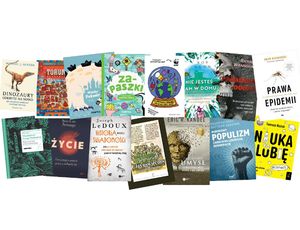
Larry Wolff’s Inventing Eastern Europe The Map of Civilization on the Mind of the Enlightenment and Joanna Guszta’s Miasto Potwór [City-Monster] are the two books that won the main prizes of the 6th Smart Book of the Year contest. The Euclid Statuettes given to the winners of the contest were also awarded to authors chosen by the JU academic community, editors of the Smart Books website as well as readers of
Books in the science communication genre describe and explain selected scholarly issues by presenting them in a simplified, reader-friendly way. These books are often not subjected to the laborious process of peer review, making them easy to publish and distribute. However, it is not uncommon for them to become a testament to a person’s research activity, popularising their work, especially among those readers that are not specialists in a narrow discipline. Therefore, popular science books should be of the highest possible quality, yet this goal is not easy to achieve. Many researchers are unable to present their complex ideas in simple terms that are understandable for a layperson. At the same time, some publishers may try to take advantage of the popularity of such books by flooding bookstores with poorly written and researched works.
The Smart Book of the Year award aims to motivate both publishers and authors to strive for the highest levels of clarity and reliability of their work. The Euclid Statuette, given each year to the best science communication publications, serves as a mark of quality for readers, as well as a positive feedback for authors and publishers.
As in the previous years, the nominees included ten books for adult readers and five children’s books. The main prize in the former of those categories went to Larry Wolff’s Inventing Eastern Europe The Map of Civilization on the Mind of the Enlightenment in which he takes a look at the stereotypical division of Europe into its eastern and western regions. The author discusses how Western European thinkers designed the image of Eastern Europe, examining stereotypes and their geneses, looking at Western Europe’s actual knowledge about the East and its plans to ‘conquer it’, ‘civilise it’ and ‘bring order’. The book contains a critical analysis of philosophical treatises, theatrical plays, memoirs, letters and legal codices. It features prominent historical figures such as Catherine the Great, Voltaire, Jean-Jacques Rousseau, Casanova, Edward Said, Jacques Derrida and Michel Foucault.
Joanna Guszta’s Miasto Potwór [City-Monster] was voted the best science communication book for children. A well-written and well-illustrated light-hearted book, it shows the youngest readers that everyone is responsible for their surroundings. It introduces children to the concept of aesthetics and sense of community by making use of funny stories and good advice.
The Jagiellonian University’s academic community as well as Gazeta Wyborcza readers chose to award Tomasz Rożek for his book Nauka. To lubię [Science. I like it]. The book is devoted to both everyday occurrences and extraordinary phenomena happening in the depths of space, discussing some of the oldest mysteries and newest discoveries related to them. The author was able to present even the most complex issues with wit and humour, and numerous real-life examples stir imagination, helping to get his point across.
Finally, the editors of the Smart Books website voted to award the Euclid Statuette to Rob Dunn in recognition of the book Never Home Alone: From Microbes to Millipedes, Camel Crickets, and Honeybees, the Natural History of Where We Live. The author and his collaborators adopted synecological methodology do study the largely overlooked ecosystem of our homes. The book is helpful in explaining how our interactions with the organisms that live in our environment impact our health and mood, providing the reader with exhaustive – indeed, for some perhaps too exhaustive – information of everything that lives close to us.
The Smart Book of the Year contest was organised for the sixth time jointly by the Jagiellonian University and the Smart Books website. Copernicus Festival, Kraków bookshop De Revolutionibus Books & Café, and Gazeta Wyborcza daily are partners of the initiative. The contest was presided over by a panel consisting of nuclear physicist Prof. Stanisław Kistryn, journalist Aleksandra Stanisławska, editor-in-chief of the Smart Books website Leszek Szumlas, editor-in-chief of Gazeta Wyborcza in Kraków Michał Olszewski, Carbon Footprint Foundation coordinator Marta Seweryn as well as science communicators Dr Monika Koperska, Marta Trzeciak and Dr Kamil Kopij.





